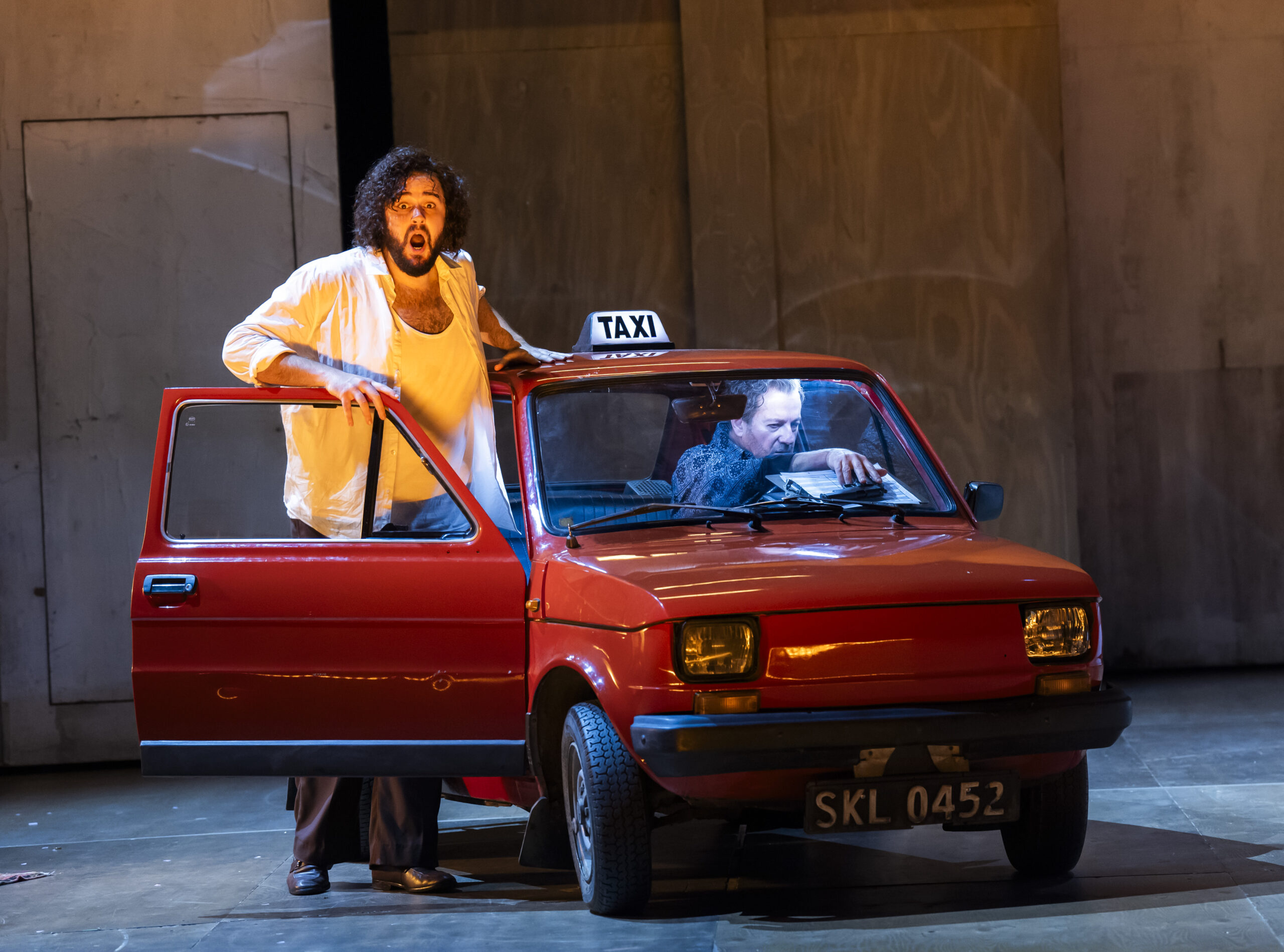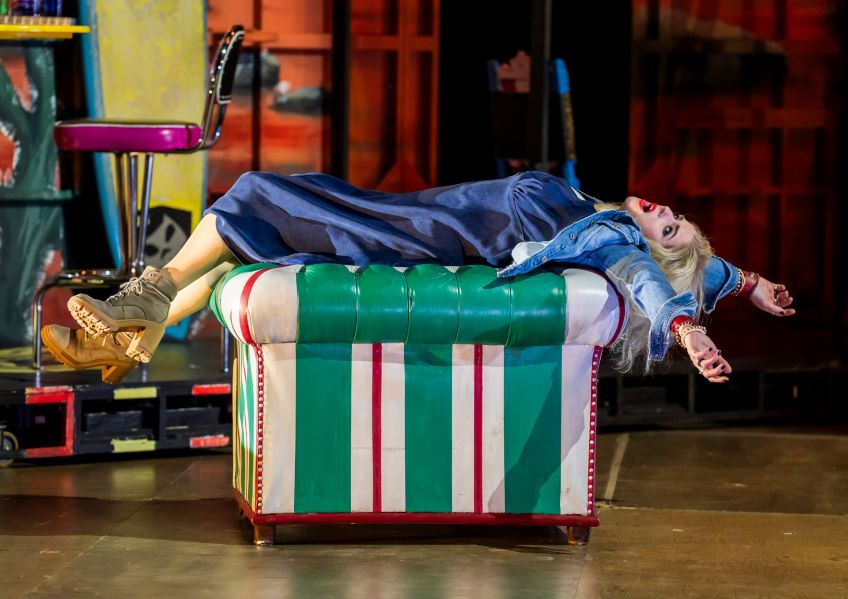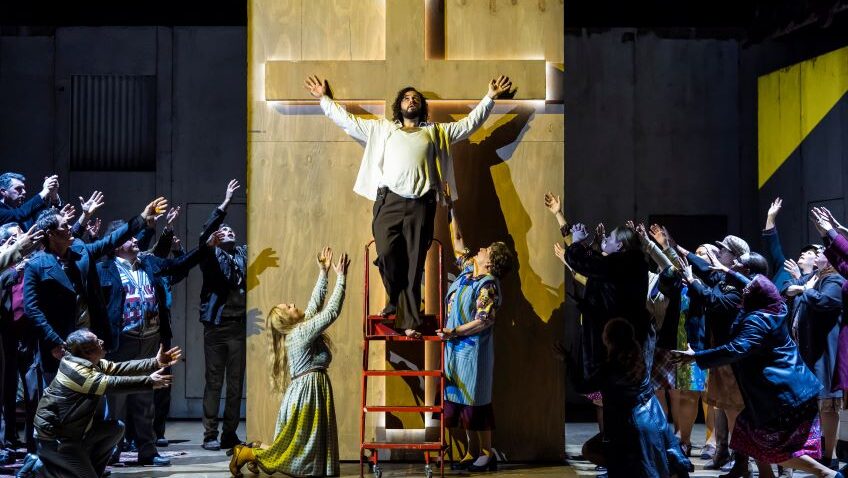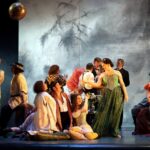Opera North has designed this red-blooded double bill to bring twice the thrill. And so it does – in ways both wonderful and weird. Set in different times and places, each one-act opera revolves around love-triangles of intense passion, anguish, infidelity, obsessive jealousy, wounded honour and a compulsion to exact ultimate, brutal revenge.
While the two separate works, now paired for the first time, are staged to create striking visual and setting contrasts, clever character links have been introduced that marry the one work with the other to add startling sparks of interest.
Mascagni’s best loved work, Cavalleria Rusticana (Rustic Chivalry) is gloriously orchestrated and the musicians of the Orchestra of Opera North, under the animated guidance of Guest Conductor Antony Hermus, thrill throughout with their playing both in this and in Rachmaninoff’s richly textured Aleko score. From tender moments and moody broodings the music sweeps into grand drama and full-blown passion as the harp swirls, strings and woodwind shimmer, bassoons and horns bubble and plead, an organ gets churchy, cymbals crash and percussion explodes as required, with wonderful instrumental passages featuring high as onstage scenes are silently enacted. The singing from principals and chorus alike is strong, passionate, powerful and thrilling, some fine, gentler moments coming from the fabulously good chorus. The soul-inspiring melodies of the Easter Hymn and heavenly, instrumental Intermezzo, known the world over, are beautifully moving.
Based on a 1883 play by Verga, Cavalleria Rusticana premiered in 1890, written by Mascagni to bring verismo to opera by featuring, not nobility, but everyday people with their own complex problems and passions. Mascagni set the piece in the tight-knit community of an impoverished Sicilian village, where religion, sin and honour loom overwhelmingly large. But our characters inhabit a different, impoverished community in this revival of Opera North’s 2017 version, directed by Karolina Sofulak: we’re now in 1970’s Communist Poland, yet the characters and their preoccupations remain the same.

For this melodrama with its somewhat one-dimensional characters Charles Edwards’ set fills the stage with tattered shabbiness: the stark, grubby white tiles and counter of a shop, shelves largely empty, where poor folk queue in diverse, frumpy attire but often leave empty-handed (though at Easter, like a miracle, bread and wine bottles appear for one and all); opposite is the facade of a home, a simple carpet, chair and stretch of uneven wallpaper setting its inside before us. Spanning the two locations, chipped, grubby white boards feature a central wooden panel and inbuilt massive cross, which lights up and rolls forward on this Eastertide.
Shopkeeper Lucia, in her overall, is sung earthy and mature by Anne-Marie Owens who also maintains a silent, “invisible” presence through many scenes. Her beloved son, tormented Turiddu, is obsessed with his former love, Lola, even though she’s now married to big man, wheeler-dealer Alfio. In frustration, he seduces Santuzza, a highly religious, bespectacled woman in a cardy who falls for him wholeheartedly. Alas, his frenzied, lustful obsession with Lola (who’s no sizzling sex-kitten, but a staid young lady in well-buttoned blouse and sensible skirt) cannot be tamed and their stormy liaison resumes.
The clarity and intensity of relationships and interactions does tend to blur and diminish as characters roam across locations, sometimes unaware of one another, often not interacting directly but singing into the air or even singing a duet with one person whilst physically interacting with another – as when Turiddu physically engages with Lola as he duets with Santuzza. This may emphasise the complexity of their relations and their aloneness but it also fails to build fuller credibility in the characters and relationships, and unfocused, unrelenting, overblown, melodramatic passion can sometimes stretch too far and lead to chuckles.
The singing, however, is superb. Mezzo Gisele Allen, distressed, distraught and furious as slighted Santuzza, sings at all times with stunning power, passion, elegance of tone and soaring sweeps of phrase. Ditto tenor Andres Presno as Turiddu, his bright tones travelling from brooding discontent to sustained, all-out, spleen-venting passion.
Wonderful does turn to bizarre, or almost creepy, though, when Turiddu – who hasn’t earned our empathy – assumes the position of Christ on the cross (via a step-ladder) as Santuzza lies singing into the air, her long, Mary-Magdelene hair caressing his bare feet. Later, like a lamb to the slaughter, Turiddu willingly climbs into Alfio’s little red taxi-car and waits with utmost patience for cuckolded Alfio (sung sturdy by baritone Robert Hayward) to avenge his honour in bloody, rustic chivalry fashion. Hmmm. It’s just as well the score and singing are so good!
Aleko (1892), Rachmaninoff’s first opera, was hastily written for his graduation at 20 but its rich, Tchaikovski-esque variety and impetus are admirable. Staged by Opera North for the first time and also directed by Karolina Sofulak, the opera cleverly opens on Robert Hayward, still dressed as Mascagni’s Alfio, head hung in lament, suitcase and gun in hand, drab Polish walls still behind. But then… all change.

In a trice, the set transforms, not into a Roma camp as might be expected for an opera based upon Pushkin’s 1827 poem The Gypsies, but into a bright, Bohemian commune of the 1990s. Crowds of hippies pour forth, clad in sunny shorts, T-shirts, jeans and myriad colourful, floaty garments. Soon diverse bright chairs, tables and platforms are filled with multi-level love-and-peace promoters, all chilling, chatting, smooching, drinking or smoking the odd spliff outside a vibrant tropical bar, named The World Is In Our Hands. Dancing takes over later, and stars, planets and satellites appear on high – in the guise of a wondrous variety of giant lamps, lampshades and chandeliers. Fabulous!
Changing his shirt, Alfio is now Aleko, welcomed to the commune as the lover of Zemfira and given his own mattress. With all the free love, though, Zemfira’s soon off with someone younger and, consumed by jealous rage and affronted pride, Aleko seeks the same bloody revenge as Alfio did – with the same weapon – and, indeed, on the same man – for this new lover is again tenor Andres Presno, formerly Turiddu now with longer hair and decorator’s overalls. Further links are introduced as the “ghost” of Lola silently confronts Alfio/Alezo like Lady Macbeth, her hands and arms steeped in blood. Sentuzza’s apparition appears, too, also dressed as before, while Lucia in her overall comes in to take a brief role in the new community. Ellin Pritchard with bright lips and shock of Bethany-Platt-blond hair is a lively, highly engaging Zemfira, her soprano voice full of delightful strength and clarity, while her old hippy father is nobly sung by Matthew Stiff’s burly bass. The bass notes underpinning the chords in the final hushed ensemble chorus are tremendous.
Though the Italian and Russian libretti and their simple, side-titled English translations are pretty uninspiring, the music and singing throughout are particularly glorious and the innovative links and contrasting sets maintain interest. Very entertaining.
Eileen Caiger Gray




